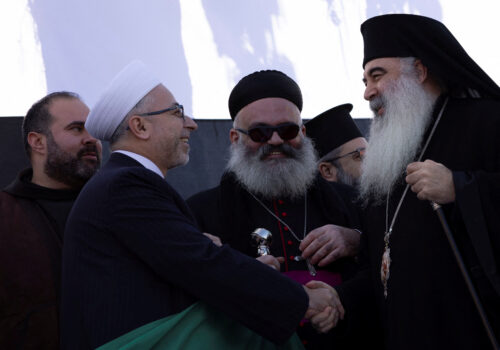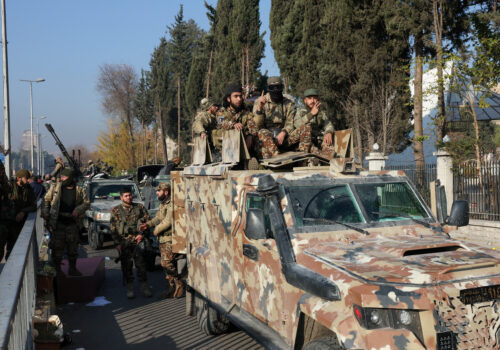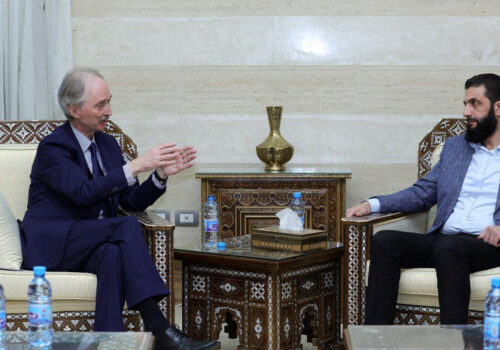A US blueprint for Syria’s fragile transition
On December 8, Syria’s opposition forces captured the capital city of Damascus from Syrian President Bashar al-Assad, who had ruled the country with an iron fist for decades. The gains were led on the ground by Hayat Tahrir al-Sham (HTS), a group sanctioned by the United States and formerly associated with an offshoot of al-Qaeda, but which has increasingly moderated its stance. The fall of Assad is not only a military victory for the rebels, but a moment of hope for Syrians who have lived under his authoritarian rule for decades. As Syrians take this time to celebrate and topple the statues and billboards of the Assad family that have haunted them for decades, what comes next for Syrians is an open question.
At this moment, HTS is eager to build goodwill inside Syria and internationally. The United States should act swiftly and strategically to help ensure the country’s transition toward a more stable and democratic system. The United States can leverage its diplomatic, economic, and political tools to influence the post-Assad landscape in Syria. Here are several critical steps the United States should consider.
SIGN UP FOR THIS WEEK IN THE MIDEAST NEWSLETTER
1. Provide diplomatic recognition to the new government
The political situation in Syria is fluid, and the future government will likely be a coalition of opposition groups, civil society organizations, and representatives from various ethnic and sectarian groups, including HTS. One of the most significant actions that Washington could take is to provide early diplomatic recognition to this emerging government—contingent on commitments to a peaceful transition, democratic reforms, and the protection of human rights. Recognition may be contingent upon specific steps, including:
- Formation of a transitional government: This government should be representative of Syria’s diverse political and ethnic groups, and include women, youth, political structures currently in exile, and opposition military factions.
- Commitment to a democratic process: The interim government should agree to hold free and fair elections with international oversight and establish a justice and accountability mechanism to address past atrocities.
- Constitutional reform: A new, inclusive constitution should be developed with input from all Syrian stakeholders to lay the foundation for a democratic governance system.
- International oversight: The United Nations should be allowed to oversee the transition, including monitoring justice and accountability processes and ensuring the dismantling of Syria’s chemical weapons program. Encouragingly, HTS has indicated its readiness to cooperate with the international community to monitor Assad regime military sites.
2. Provide humanitarian aid and reconstruction assistance
Syria faces an enormous humanitarian crisis. Millions of Syrians are displaced, and much of the country’s infrastructure is in ruins. The United States should work with international organizations to ensure that aid is distributed effectively. Given the opposition’s experience in governance, existing structures on the ground can be leveraged to channel aid, minimizing the risks that would come from trying to create entirely new systems from scratch. However, this aid should be conditional on:
- Political inclusivity: The transitional government must equitably provide aid to all regions of Syria.
- Anti-corruption measures: Donors must insist on transparency and accountability mechanisms to prevent misuse of funds.
3. Begin the process of removing sanctions on HTS and the new Syrian government
HTS is currently designated by the United States as a Foreign Terrorist Organization (FTO). The group’s evolving stances, including its recent public commitments to protect religious minorities and refrain from retributive violence, suggests that HTS may be open to political accommodation. The United States should initiate a gradual, good-faith process for removing sanctions and designations on HTS and the new Syrian government. Additionally, the United States has designated the government of Syria as a state sponsor of terrorism since the 1970s and has since added additional sanctions beginning in 2011 in response to the Assad regime’s exercise of violence and repression. This process could include:
- Phased sanctions relief on HTS: The United States should start by removing sanctions on individuals who demonstrate a willingness to engage in a political transition, particularly HTS leaders. Over time, as HTS shows concrete steps toward reconciliation, further sanctions can be lifted.
- Quick sanctions relief on Syria: Removing broader sanctions on Syria can be done swiftly, as the new Syrian government will likely be hostile to US-designated terror groups like Lebanese Hezbollah or Iraq’s Asaib Ahl al-Haq, which were instrumental in bolstering the previous Syrian regime. As for the second batch of sanctions on Syria related to the regime’s exercise of violence on civilians, if HTS follows through on its promises to refrain from retributive violence against civilians, the United States should lift this second set of sanctions as well.
- Diplomatic engagement: Engaging with HTS and other opposition groups is critical. Past US policy on similar groups, such as the Revolutionary Armed Forces of Colombia (FARC), shows that delisting a group from the FTO list is possible if the organization demonstrates a genuine commitment to peace.
4. Cooperation on counter-terror measures
HTS has a law enforcement body that has since 2017 conducted dozens of operations against Islamic State of Iraq and al-Sham (ISIS) cells operating in northwestern Syria, including arresting many members of its leadership. HTS has also arrested members of the al-Qaeda branch in Syria, Hurras al-Din, largely dismantling the organization. HTS will have an interest in preventing more extremist actors from trying to reform in Syria as the rest of the state rebuilds. The United States may thus find HTS willing to cooperate on counterterror measures.
- Intelligence sharing: Intelligence sharing on counterterrorism measures can build good faith on both sides and prevent extremist groups from proliferating.
5. Encourage SDF participation in the political process
Syria’s Kurdish population, particularly those in the northeast, will play a crucial role in the country’s future. The US-backed Syrian Democratic Forces (SDF) have been key allies in the fight against ISIS, but tensions with other opposition groups remain. The United States should encourage dialogue between the SDF and HTS, as well as other opposition factions. This dialogue could include:
- Inclusion of Kurdish leaders in the political process: A future Syria should represent the interests of all Syrians, including Kurds, Arabs, and other minorities. The United States can mediate discussions between the SDF and HTS to ensure Kurdish representation in the future government.
Seizing the moment
Failure for the United States to engage with Syria’s new leadership can lead to several negative outcomes. HTS could radicalize further if it does not have international checks or relies on other actors for diplomacy, trade, and support. Russia and Iran could fill the vacuum and partner with the new Syrian government to sideline the United States in the region. A new Syrian government without international support could fall into chaos and sow instability, leading to further mass displacement throughout the rest of the region. The United States must seize this moment to help influence the future of Syria, rather than waiting to see what happens. No potential path forward for Syria or HTS is inevitable. The sooner the United States takes concrete action, the more likely it can positively impact Syria’s future.
HTS leader Ahmed al-Shara, formerly known by his nom de guerre Abu Mohammed al-Jolani, entered the political scene in Syria over ten years ago. He has long been mindful of the lessons learned from the failures of al-Qaeda to win the support of the Iraqi people. HTS was formed by military officials who wanted to work within the contexts of the societies they lived in. HTS has continuously moderated since its inception and break from Jabhat al-Nusra—al-Qaeda’s Syria branch—in 2017. Of course, part of its strategy may be for optics, but much of the group’s rhetoric about moderation has taken the form of concrete actions. HTS has a Directorate of Minority Affairs that has guaranteed the safety of Christians and Alawites under its control. HTS has ordered its fighters not to disturb public institutions. And the larger and more diverse the population that comes under its governance, the more HTS will need to evolve and the less power it will have to determine what governance looks like on the ground.
It is important not to overstate the current moderation of HTS. The group is not a bastion of liberal democracy, and its political evolution is still ongoing. However, HTS is actively seeking diplomatic recognition and has expressed a willingness to engage with the international community. The United States should not expect perfection but should recognize that political entities are capable of evolving, especially when faced with the realities of governance and international expectations. Shara has already reached out to regional countries, including Lebanon, Iraq, and Russia, reassuring them that he intends to have good relations despite past support their past support for Assad. If HTS proves genuinely open to dialogue and reform, the United States should pursue engagement rather than exclusion.
As long as HTS is willing to evolve and accept constructive criticism, the United States should engage with the group. Ignoring Syria’s new leaders will not make them go away. US outreach to HTS is not just engagement for the sake of engagement. A post-Assad Syria, especially one with leaders willing to engage with Washington, presents an opportunity for the United States to promote stability and democracy in the Middle East, curb Iranian and Russian influence in the region, and provide a safe and secure home for Syrians both inside and outside Syria.
Sana Sekkarie is a digital threat analyst focusing on the Middle East. She was previously a researcher focused on Syrian opposition groups at the Institue for the Study of War and the University of Virginia.
Further reading
Fri, Dec 20, 2024
What will minority and women’s rights look like in the new Syria?
MENASource By Sinan Hatahet
After years of conflict and division, there is an opportunity to build a more inclusive and just future that reflects the resilience, diversity, and aspirations of all Syrians.
Wed, Dec 18, 2024
What the fall of the Assad regime really means for China
MENASource By Jonathan Fulton
Assad’s fall makes the Middle East more complicated for Beijing but does not threaten China’s most important relationships in the region.
Wed, Dec 18, 2024
The fall of the Assad regime is just the beginning of Syria’s quest for stability
MENASource By
Sectarian divisions and external actors threaten to render the fall of the Assad regime a new phase in Syria’s civil war rather than its conclusion.
Image: People hold flags adopted by the new Syrian rulers, during a celebration called by Hayat Tahrir al-Sham (HTS) at the Umayyad Square, after the ousting of Syria's Bashar al-Assad, in Damascus, Syria, December 20, 2024. REUTERS/Ammar Awad REFILE - CORRECTING LOCATION FROM "NEAR UMAYYAD MOSQUE" TO "AT UMAYYAD SQUARE".


